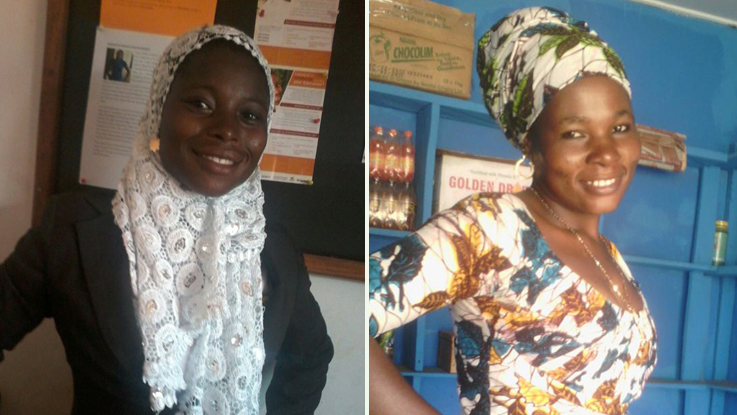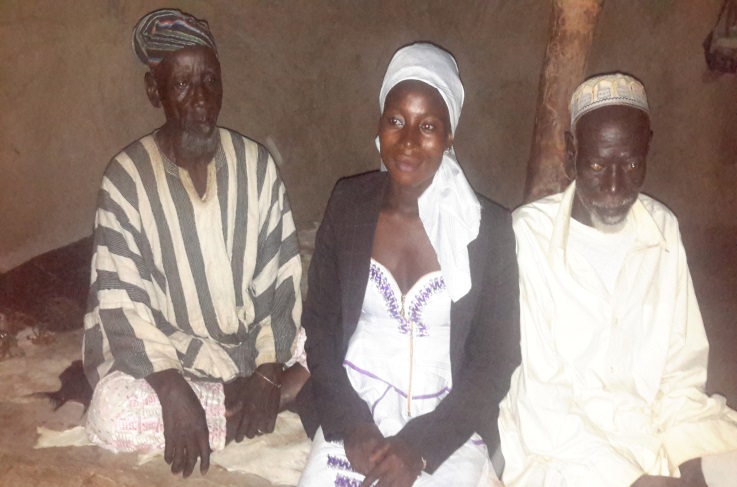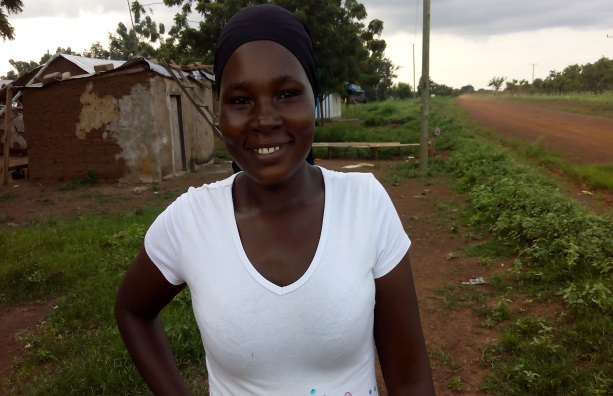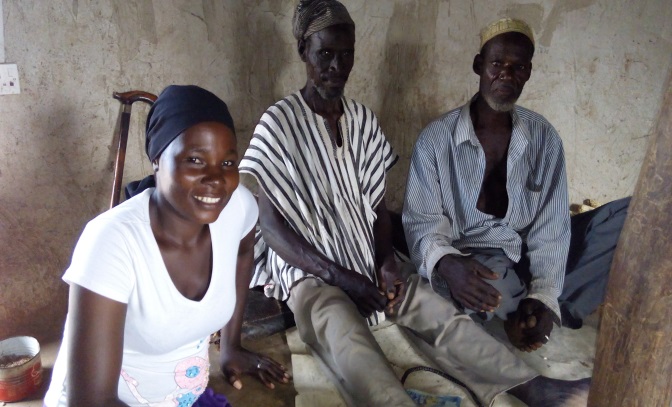CAMA’s New Politicians: The Exception that Changes the Rules

Karaga District Councillors Safura Yussif (left) and Hawa Tambo
The rural district of Karaga in the Northern Region of Ghana has 33 district assembly members – 30 men and only 3 women.
But 2 of the 3 women are members of CAMA, Camfed’s pan-African alumnae network. Their recent election speaks volumes about the network’s success in opening up new leadership pathways for women who were once the most vulnerable young people in society.
Meet CAMA members Hawa Tambo and Safura Yussif – women who now have a strong voice in local politics, with full support from traditional leaders. These exceptional young women are working to change the rules.
In time past, women … could not speak at gatherings and did not attend meetings at the chief’s palace even if it concerns them…Hmm! the revolution has been very fast, the wheel has turned and a new era has begun. The CAMA young women now call for community gatherings to educate us and since then, I knew a day like this will come when women will take up leadership positions. I support the young lady, she deserves it and I know she will do well in her new position.
Naa Adam Fuseini, Chief of Gunayilli
Safura Yussif: A Woman from a Community with no Light Becomes a Shining Light for Many Communities
Safura is from one of the poorest rural districts in Ghana. She lost both parents when she was a teenager, and would have dropped out of school had she not been selected for support from Camfed. After graduating from high school, Safura joined CAMA. Winning the election for CAMA district chairperson, Safura encouraged her fellow CAMA members to volunteer in the hardest-to-reach communities, and led by example. As a peer educator, she delivered essential health information, financial literacy and entrepreneurship training in local schools and villages, and made such an impression that she was offered a job as a mobile banker. She also helped identify out-of-school children, making sure that they received the support to enrol back in school.
The area’s traditional leaders encouraged Safura to stand for election. She was also approached by women’s groups and other community members to stand. Safura contested the assembly elections in Gunayilli, an area of 14 communities, with two men and won by a very large margin.
I will use my influence to get more girls educated.
Hon Safura Yussif, District Councillor and CAMA member
 “I am going to use my position as the assembly person of my electoral area to discourage myths about girls’ education. I will help to build strong structure in the schools to promote education especially on the enrolment and retention of girls in schools. Camfed has sowed a seed and I have germinated. I will use my influence to get more girls educated,” says Safura.
“I am going to use my position as the assembly person of my electoral area to discourage myths about girls’ education. I will help to build strong structure in the schools to promote education especially on the enrolment and retention of girls in schools. Camfed has sowed a seed and I have germinated. I will use my influence to get more girls educated,” says Safura.
Congratulating Safura on her victory, the Chief of Gunayilli, Naa Adam Fuseini, said, “The era of perceiving women to belong only in the kitchen has passed because we have shining example like Safura coming from a community with no light and good drinking water and bad access road to becoming a leader for many communities. In time past, women could hardly walk past the premises of the chief’s palace…They could not speak at gatherings and did not attend meetings at the chief’s palace even if it concerns them. For those who contributed during public fora they were seen to be disrespectful to their husbands…Hmm! the revolution has been very fast, the wheel has turned and a new era has begun. The CAMA young women now call for community gatherings to educate us and since then, I knew a day like this will come when women will take up leadership positions. I support the young lady, she deserves it and I know she will do well in her new position.”
Hawa Tambo: The First Girl to Go to School in Her Village
 Hawa was brought up in the Karaga District of Northern Ghana, where she became the first girl in her village to attend school, taking herself to primary school in spite of having neither shoes nor a uniform. Ultimately, she received help to attend and complete school through Camfed, and became the village champion for girls’ education. “The people of my village are now very interested in girls’ education. The community has a primary school now and a lot of them are sending their girl children.”
Hawa was brought up in the Karaga District of Northern Ghana, where she became the first girl in her village to attend school, taking herself to primary school in spite of having neither shoes nor a uniform. Ultimately, she received help to attend and complete school through Camfed, and became the village champion for girls’ education. “The people of my village are now very interested in girls’ education. The community has a primary school now and a lot of them are sending their girl children.”
The people of my village are now very interested in girls’ education.
Hon Hawa Tambo, District Councillor and CAMA member
Hawa joined the CAMA network in 2011 and was selected as the District Vice Chairperson in 2012. Trained as a peer educator and Community Health Activist, Hawa shared her expertise with other CAMA members and her community. She was selected to join the Innovation Bursary Program, created by Camfed and The MasterCard Foundation. The program exposes young women from marginalized communities to new knowledge, skills, and markets through business mentors and internships. Hawa received strong support for her decision to stand for the assembly elections, which she won against a prominent male opponent by 2063 against 287 votes.
Honorable Hawa showed everyone in the electoral area her abilities and confidence. We wanted a leader who will serve the community well and Honorable Hawa had done that through the advocacy campaign she did as a CAMA member.
Naa Abukari Kwami, Chief of Nangun Nayilli
 Hawa has the full support of village elders and the Chief. “The knowledge gained by women benefits a larger population of the community,” said the Chief’s spokesperson Kukunaa Sumani, who also added that education played a major role during the campaign process. “An educated woman will take better care of her community.” The Chief of Nangun Nayilli, Naa Abukari Kwami, said, “We have always heard of women’s empowerment and women in leadership. We never thought a young lady from our community could demonstrate this potential very early. Honorable Hawa showed everyone in the electoral area her abilities and confidence. We wanted a leader who will serve the community well and Honorable Hawa had done that through the advocacy campaign she did as a CAMA member.”
Hawa has the full support of village elders and the Chief. “The knowledge gained by women benefits a larger population of the community,” said the Chief’s spokesperson Kukunaa Sumani, who also added that education played a major role during the campaign process. “An educated woman will take better care of her community.” The Chief of Nangun Nayilli, Naa Abukari Kwami, said, “We have always heard of women’s empowerment and women in leadership. We never thought a young lady from our community could demonstrate this potential very early. Honorable Hawa showed everyone in the electoral area her abilities and confidence. We wanted a leader who will serve the community well and Honorable Hawa had done that through the advocacy campaign she did as a CAMA member.”
A New Era Has Begun
Through their deep empathy and swift action to improve the lives of the most vulnerable people in their districts, CAMA members are showing their communities what change looks like. They are galvanising the support of men and women, boys and girls, traditional leaders and politicians. These new philanthropists have the knowledge and the sensitivity required to build a broad coalition for change – at home, in schools, in villages, districts and nations. Together, as Hawa and Safura’s story illustrates, they are the unstoppable force that heralds a new era. Women politicians may still be the exception, but not for long, because now they are re-writing the rules.
